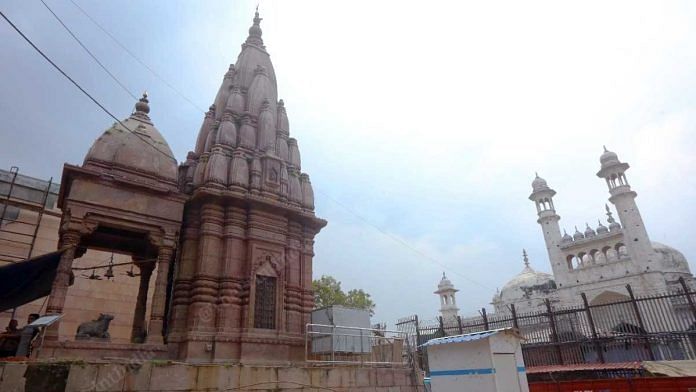New Delhi: The district court in Varanasi is currently hearing an application to decide whether a suit backed by a Hindu outfit seeking year-round access to pray in the disputed Gyanvapi mosque complex is maintainable.
The application, filed by the Anjuman Intezamia Masjid Committee — which manages the mosque — invokes Order VII, Rule 11 of the Code of Civil Procedure, 1908, a law that lays down the legal procedure for all civil cases in India.
The suit in question was filed by five women in August 2021. It had sought permission for daily worship at the ‘Ma Shringar Gauri Sthal’, located along the outer wall of the mosque, and also to the “visible and invisible deities within the old temple complex”.
The wall is visible to onlookers, but regular worship is not allowed here, except on the fourth day of Chaitra Navratri each year.
On 19 May, a commission appointed by the Varanasi court to conduct a survey of the mosque complex submitted its findings.
However, a day later, the Supreme Court, while hearing the mosque committee’s appeal opposing the survey, transferred the case from a civil judge to the Varanasi district judge. While doing so, a three-judge bench headed by Justice D.Y. Chandrachud also ordered the district judge to prioritise the mosque committee’s maintainability application.
ThePrint explains what Order VII, Rule 11 — the provision under which the original suit has been challenged — is and how it applies to the Gyanvapi suit.
Also Read: Aibak, Akbar, Aurangzeb—the Gyanvapi divide & why a controversial mosque has a Sanskrit name
What is Order VII, Rule 11
Order VII, Rule 11 of the Code of Civil Procedure deals with ‘rejection of plaints’.
The provision is a precondition of a suit — simply put, it helps determine if proceedings in a case can continue. The Supreme Court has held that the rule can be applied at any stage of the case. Not only can a court throw out a suit before it has been tried, but there have also been instances where courts have refused to allow suits to proceed even after they were instituted and assigned a unique number.
There are six circumstances under which a plaint could be rejected. One of these, Order VII Rule 11 (d), pertains to when a suit is barred under an existing law.
It is this subclause that the Anjuman Islamia Committee has invoked in the Gyanvapi Mosque dispute. The mosque committee has argued that the suit is not maintainable because it violates the Places of Worship Act, 1991.
The Act, passed when the Babri Masjid-Ram Janmabhoomi dispute was at its peak, freezes the status of a religious place as it existed on 15 August 1947 — the day of India’s independence.
While reading out the court’s order on 20 May, Justice Chandrachud had told both parties in the Gyanvapi Mosque dispute case that they could appeal the Varanasi district judge’s order before either the Allahabad High Court or the Supreme Court.
The Varanasi court will continue hearing the mosque committee’s application Monday.
Akshat Jain is a student of the National Law University, Delhi, and an intern with ThePrint
(Edited by Uttara Ramaswamy)
Also Read: A temple in the Taj Mahal? What Mughal-era documents tell us about tangled claims



